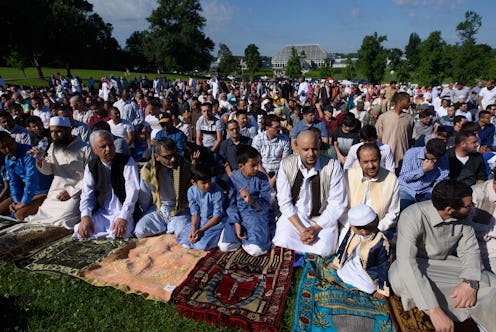News
The White House Refused To Celebrate Eid

Breaking with more than 20 years of precedent, Donald Trump didn't host a White House Eid celebration on the day that marks the end of a month of fasting. The modern tradition began in 1996, when then First Lady Hillary Clinton hosted an Eid dinner in the Old Executive Office Building. Since then, presidents have hosted the dinner each year, inviting Muslim cultural leaders, diplomats, and celebrities to join the festivity.
The White House reportedly released a brief statement marking the event this year, though it is not found on the White House website. "Muslims in the United States joined those around the world during the holy month of Ramadan to focus on acts of faith and charity," the White House statement read, according to MSN News. "Now, as they commemorate Eid with family and friends, they carry on the tradition of helping neighbors and breaking bread with people from all walks of life."
Eid al-Fitr kicks off a month of celebration after the previous month's fasting during the holiday of Ramadan. Muslims use a slightly different calendar to mark their yearly celebrations, so Ramadan gets moved forward by 11 days each year. That made this year's Ramadan an even bigger challenge because it overlapped with the longest days of the year, extending the fasting hours.
Trump has been criticized for his administration's response to various events throughout Ramadan, starting with the White House statement at the beginning of Ramadan that was heavily focused on terrorism. In the aftermath of the terrorist attack in London two weeks ago, Trump made several references on his Twitter to his "travel ban," which Trump openly stated was targeted at keeping Muslims from entering the United States. In addition, several high-profile murders of Muslims in the last month have largely gone unmentioned by the White House.
According to CNN, Secretary of State Rex Tillerson also declined to host an Eid dinner. The State Department's Office of Religion and Global Affairs reportedly applied to host the dinner, which has been hosted by the Secretary of State since 1999, but Tillerson personally rejected the request, CNN reported. It's unclear whether this was a coordinated strategy between the White House and the State Department — Bustle reached out to the State Department for comment but did not immediately receive a reply.
However, last month, BuzzFeed's Hannah Allam reported that many Muslim cultural leaders neither expected nor particularly wanted to attend a Ramadan celebration with Trump. Even Minnesota representative Keith Ellison, the first Muslim elected to Congress, spoke out against Trump. "
While I was honored to attend White House Iftar hosted by Presidents George Bush and Barack Obama, I can't imagine attending an Iftar hosted by Donald Trump," Ellison said in a statement to BuzzFeed News. "I have not seen any evidence of good will toward the Muslim world from him. I have only seen a steady stream of contempt and hostility."